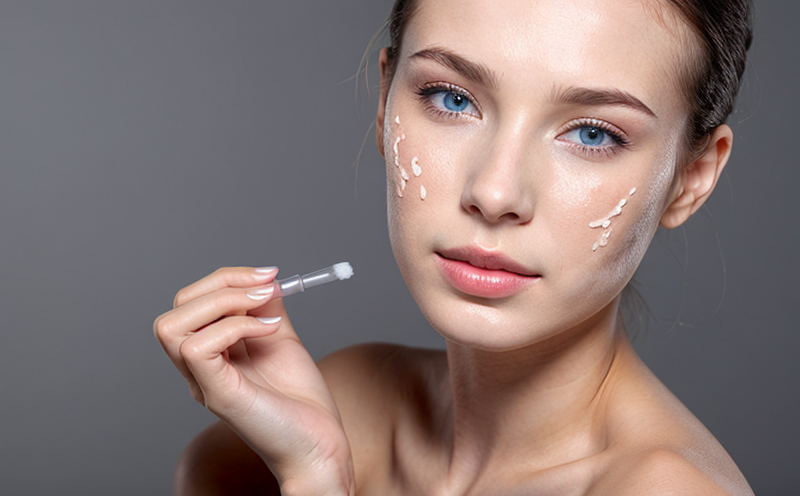Irritation Testing of Cosmetic Packaging Interaction
Understanding the potential for irritation when cosmetic products interact with their packaging is crucial in ensuring consumer safety and satisfaction. This service focuses on evaluating the compatibility between cosmetic formulations and their containers, lids, or closures to prevent adverse reactions such as erythema (redness), edema (swelling), or contact dermatitis.
During this comprehensive testing, we assess various factors that could contribute to skin irritation, including the material composition of packaging components, chemical compatibility between the product and container, and the physical conditions under which they are used. This service aligns with international standards such as ISO 10993-18:2017, which provides a framework for biological evaluation of medical devices; although primarily aimed at medical applications, its principles can be adapted to cosmetic packaging.
The testing process begins by selecting the appropriate specimens representing both the cosmetic product and its container. Specimens are prepared according to established protocols, ensuring they accurately reflect real-world conditions. The specimens are then exposed under controlled conditions that simulate typical use scenarios for extended periods. Throughout this process, detailed observations are recorded regarding any visible signs of irritation.
After exposure, the specimens undergo thorough analysis using advanced analytical techniques such as optical microscopy and scanning electron microscopy (SEM). These methods help identify subtle changes in skin structure or surface characteristics that might indicate an adverse reaction. Additionally, we may employ biological indicators like human cell lines to quantitatively assess any potential toxicity.
The results of these tests provide valuable insights into the safety profile of a cosmetic product's packaging interaction, enabling manufacturers to make informed decisions about material selection and design modifications if necessary. By adhering strictly to rigorous testing procedures outlined in relevant standards like ISO 10993-18:2017, we ensure that our findings are reliable and internationally recognized.
Our expertise extends beyond mere compliance; we also offer guidance on best practices for minimizing risks associated with cosmetic packaging interactions. Our team comprises seasoned professionals who possess deep knowledge of both the theoretical aspects and practical implementation challenges involved in this specialized field.
This service plays a pivotal role in protecting public health by preventing potentially harmful products from reaching market shelves. It supports regulatory requirements while enhancing brand reputation through proven safety standards.
Industry Applications
The application of irritation testing for cosmetic packaging interaction is widespread across various sectors within the beauty and personal care industries. Manufacturers, especially those focusing on niche markets or high-end products, rely heavily on this service to ensure their offerings meet stringent quality control measures.
For instance, companies developing innovative skincare lines must consider how different materials like glass bottles or metal tins could affect product efficacy over time due to chemical interactions. Similarly, fragrance manufacturers need assurance that their scents remain stable and pleasant when encapsulated within specific packaging types.
In addition to new product development stages, ongoing quality assurance programs benefit greatly from periodic reassessment of existing formulations and containers using this testing method. This helps maintain consistent performance levels across all batches produced throughout the lifecycle of a given cosmetic line.
Quality and Reliability Assurance
Ensuring high standards in cosmetic packaging interaction is essential for maintaining customer trust and loyalty. Our rigorous quality assurance processes encompass multiple layers, from initial sample preparation to final analytical evaluation.
We employ state-of-the-art laboratories equipped with cutting-edge equipment capable of detecting even minute changes indicative of irritation potential. Our trained technicians follow standardized procedures meticulously documented in international standards such as ISO 10993-18:2017, guaranteeing consistency and accuracy across all tests performed.
Our commitment to excellence does not stop at technical proficiency; we also prioritize transparent communication with clients throughout the testing process. Regular updates on progress keep stakeholders informed about critical milestones achieved during each phase of evaluation. Post-test consultations further enhance understanding by addressing specific concerns raised by interested parties regarding findings and recommendations derived from our analyses.
International Acceptance and Recognition
The acceptance and recognition accorded to irritation testing for cosmetic packaging interaction globally reflect its significance in safeguarding consumer health worldwide. Regulatory bodies around the globe, including those in Europe (EC), United States (FDA), Japan (Pharmaceuticals and Medical Devices Agency - PMDA) and others, mandate compliance with recognized standards.
ISO 10993-18:2017 serves as a widely accepted guideline for biological evaluations of medical devices but finds application in cosmetic packaging due to its broad applicability. Adoption by numerous countries ensures uniformity in testing protocols, facilitating smoother international trade and reducing barriers between markets.
Our adherence to these internationally recognized norms enhances credibility among regulatory authorities and potential clients alike, fostering confidence in our services' reliability. By participating in global initiatives aimed at harmonizing safety assessments across borders, we contribute positively towards broader industry goals.





